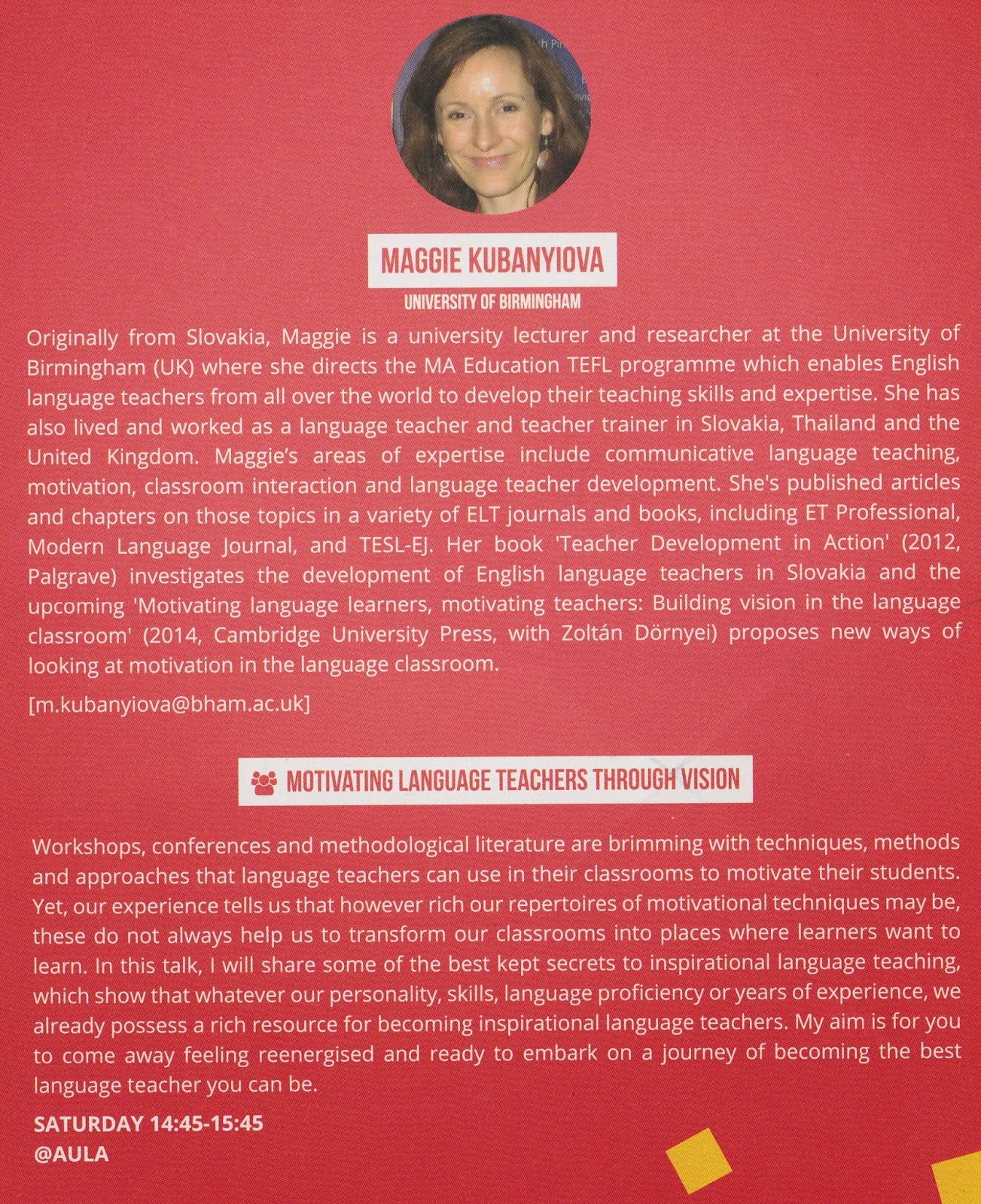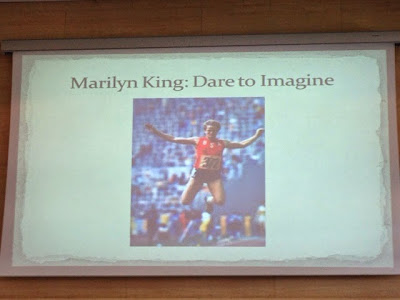The first plenary session for
TESOL France is delivered by Carol Read, the President of IATEFL (The
International Association of Teachers of English as a Foreign Language). Read
is a teacher with over 30 years’ experience as a teacher, teacher educator,
academic manager, materials writer and consultant. She has taught all ages and
has a lot of experience with primary classroom teaching, having written a
number of books including “Bugs” and “500 Activities for the Primary
Classroom”.
The purpose of her talk is to
explore and share ideas of being a highly effective teacher in a time of social
and technological change in most of our classrooms. Her talk is intended to
apply to all levels, from Very Young Learners through to Teacher Education.
She begins her talk with a story
about a woman who has a drippy faucet in her house. She looks for solutions and
in the end hires a plumber to fix it. The plumber comes and pulls out a little
hammer, taps a pipe lightly and the problem is fixed. The woman gets charged
£50 for the service and is outraged. A detailed invoice was:
·
Tapping on the pipe - £5
·
Knowing where to tap - £45
This is a metaphor for teaching, where we spend most of our
lives learning “where to tap” on our students to provide language development.
We do this by:
·
Observing
·
Asking for feedback
·
Listening to students
·
Etc.
The ultimate goal is reflective
practice. Going through a reflective cycle as below from Pollard (2005):
She also shows this diagram from
Pollard and Tann (1993), which describes the macro and micro dilemmas where we
make decisions about the courses we teach and follow paths and methods that are
imposed on us. Taking into account a number of factors and relationships to
come to a final classroom outcome.
The Conscious/Unconscious,
Competence/Incompetence model attributed to Bardwell (1969) shows a table that
stages of development in sequence from not knowing anything to knowing
something and using it unconsciously.
Competence
|
Incompetence
|
|
Conscious
|
3
|
2
|
Unconscious
|
4
|
1
|
She applies this to students, and
then extends it quite aptly to teacher education and professional development
and how we learned to work with new student groups, new methods, and even new
technologies and progress through these stages ourselves. We are given an
opportunity to reflect on our own stages of development in our teaching and our
work, considering to what extent it’s natural and easy for us to apply
different skills. I personally know that I went through all four of these
stages in sequence last year during my first ever experience teaching Very
Young Learners, passing through complete panic through my IH CYLT course and by
the end complete and natural comfort with my group of kids who I grew to love.
I now find myself somewhere between 2 and 3 as I enter new duties managing
professional development for a language school, where I am working hard to
train myself to be competent and effective at what I do.
Reade them moves her talk onto a
discussion of the features of teaching in the 21st century. Issues
that we as teachers run into in the modern age of ELT. Namely:
·
Knowledge of Technology Explosion
o
Where we need to learn to filter and pick things
up as they are useful to us.
·
Status of the profession
o
Where we as a profession find ourselves often
slighted by the societal role that teachers have been denigrated to in most
countries.
·
Public scrutiny and accountability
o
Falling standards and educational issues end up
getting pinned on teachers themselves.
·
Perceptions about “good” teaching
o
Fighting against ideas of a “good” teacher as a
fountain of knowledge delivering knowledge to attentive, note taking students.
·
Essential need for Continuous development and
learning
o
The fact that nowadays with the changing
landscape we as teachers are never finished training, and must constantly keep
up with current methodologies and attitudes to education.
In essence, what we’re seeing is a change in the language of
educational discourse. Articles of educational technology, among other
innovations come through with buzzwords like:
·
Personalization
·
Interactive
All of which have changed in meaning from human-focused definitions
to technology-focused definitions.
She then shows us her “Reflective Teacher Wheel” showing the
8 letters on the wheel that represent factors for reflections for teachers to
filter and adapt to their own teaching.
The above showing the following points:
·
Mindset
o
The importance of our beliefs, underpinning what
we do as teachers and impacting the ways we bring about change to student lives
in our classrooms. How the typical habits, behaviors and attitudes of teachers
impact lessons. Things like:
§
Resourceful
§
Knowledgeable
§
Dedicated
§
Flexible
§
Engaging
§
Available
§
Caring
§
Etc.
o
All of these habits and behaviors being informed
by our own principles and beliefs as in the below diagram, and related quote:
o
Reade makes the point about the importance of
Growth Mindset informing motivation, citing a researcher from Stanford (Carol
Dweck (sp?) dividing students into “helpless oriented” and “mastery oriented”,
showing that students either give up when they face a problem and take it as a
reflection on themselves choose to persist and look for a way to succeed.
·
Rapport
o
The ability to build a state of trust and
respect with our students. This is highly individual and varies from teacher to
teacher. A study that was done with primary school children in Spain, where
they were asked “What makes a teacher special for you?” The student responses
included:
§
Patient
§
Kind
§
Funny
§
Treats you as a person
§
Makes you work
§
Tells you off when necessary, but doesn’t get
angry or shout
§
Can explain things clearly
§
Doesn’t have favorites
§
Doesn’t go on and on
o
Matching and mirroring is another aspect that
builds rapport where being able to find common ground and empathize with people
this way can be used (for better or worse) to match interests and relate to our
students.
·
Engagement
o
The crucial element, underpinning everything we
do. “Engagement is the soil that makes learning sustainable” is a quote from
(SOMEONE, Look it up) about education.
o
This connects directly to Stephen Krashen’s talk
yesterday about the importance of Flow as a state students will get into in an
ideal world that will drive their emotional involvement in what they’re doing.
This is illustrated nicely by this graphic:
o
Six foundations of flow based on Csziksentmilhayi’s concept include:
§
Appropriate level of challenge
§
Opportunities for collaborative work
§
Learners have the necessary skills and
strategies
§
Clear and worthwhile goals
§
Feedback is integral to the process
§
Tasks are intrinsically motivating
·
Support/Scaffolding
o
This is used in the sense of helping learners
move through “the zone of proximal development” from Vygotsky’s theories of
language acquisition – supporting the difficulty and challenge of tasks.
o
This also includes taking a backseat and handing
tasks over to students to manage. This was designed for young children, but
researchers have investigated and found that it works well for adult EFL/ESL
classrooms at global, activity and local/interactional levels of classroom
activities and interactions (Van Lier, 1996).
o
A further point on scaffolding is “distancing”
strategies to move back and open up the thinking about topics to provide more
opportunities for discussion.
·
Impact
o
Having to do with feedback, paying attention to
the impact you’re having on learners at every stage beyond test scores and on
to non-verbal signals like eye-contact, fidgeting, and other telltale signs
that inform where our students are and how they are dealing.
§
The crucial thing here is acting and reacting to
these signals.
·
The Language of Learning
o
Learner autonomy!! A personal favorite of mine.
This point deals with developing our learners knowledge of strategies and
skills that we are working on together. Informing their ability to talk about
their own learning in these terms:
·
Expectations
o
If we have mediocre expectations of our learners
– they will be mediocre. The way we treat our students and interact with them
ultimately affects dynamics more than most anything else.
o
She gives an example of teaching the story below
to a group of 30 Croatian students in a recently post-war environment while
being observed by 60 teachers at a conference. Amazed at the ability these
children had to express their thoughts and memories of the war with her in this
context.
·
Collaboration
o
Working with each other, sharing ideas with
other teachers and focusing on where we can get ideas and how to share ideas is
the best way to be a highly effective teacher. Attending conferences is part of
this, but sharing in a staffroom is just as effective.
o
For our students this means providing them
opportunities to share ideas and strategies in class based on their common
experience as students in the class.
Reade concludes by encouraging us to make our own wheel and
modify it to suit our needs then use it to reflect on our own teaching and
development.
For more information about Carol Read's ELT writings and ideas, find her here:
www.carolread.com
http://carolread.wordpress.com
@carolread































